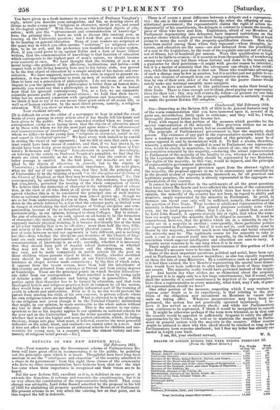Camberwell, 22d February 1864.
Sin—Deserving as the Reform Bill of 18,54 in its general features may be of the warm commendation that you have bestowed upon it, several of its parts are nevertheless, fairly open to criticism ; and they will be, I trust, thoroughly discussed before they become law.
First, with regard to that portion of the measure which provides for the special representation of the minority. This provision strikes me as not only fantastical and entirely novel, but as essentially unsound. The principle of Parliamentary government is that the majority shall govern. The existence of any part in the representative system which shall have a tendency to neutralize the operation of this principle, must be of course opposed to and be inconsistent with it. To find a means, therefore, whereby a minority shall be enabled to send to Parliament one representa- tive, would be clearly to neutralize, to the extent of one, one of the two re- presentatives returned by the majority,—reducing the actual representation in Parliament of the majority of the locality to one, whereas it was intended by the Legislature that the locality should be represented by two Members. The tights of the majority, in this way, would be injured, and the principle of representative government undermined. But, regarding the proposed provision apart from the abstract rights of the majority, the proposal appears to me to be unnecessary and uncalled-for in the present system of representation, inasmuch as, for all practical and legitimate purposes, the minority is already represented in the aggregate re- presentation of the country.
It cannot be pretended that in the settlements of all the great questions that have stirred the hearts and have affected the interests of the community during the last thirty years, respecting which there has been a division of opinion, the minority of the country has not been, in regard to ability and numbers, amply represented by the minority in Parliament. In proof, to instance one recent case only will be sufficient, namely, the settlement of the question of Free Trade. What further or additional representation of the minority is therefore needed ? For general purposes certainly none what- ever, nor for local purposes either, that I can see. I admit that, as stated by Lord John Russell, it appears scarcely fair or right, that when the num- bers are nearly equal the minority shall -be obliged to succumb. It must be remembered, however, that the politics which are in a minority in one lo- cality are in a majority in another ; consequently, those particular politics are represented in Parliament ; but if it were not so, each locality must be bound by the majority, however much more intelligent and better educated the minority may be. The legitimate course for the minority to take in such a case is to convert itself into the majority, by the influence and the conviction which superior intelligence and education are sure to carry. A majority never remains to be one long when it is in error.
There might also result considerable inconvenience if this portion of Lord John Russell's measure were to become law.
Some of the most important questions, political and social, have been car- ried in Parliament by very narrow majorities ; as also has equally depended on them the fate of some Ministries. By a contrivance such as now proposed, it it had then existed, the few Members representing the special local minor- ities would have been sufficient to alter entirely the issue of those import- ant events. The minority really would have governed instead of the major- ity! And herein lies what strikes me as chimerical about the proposal. At present it. is to apply only to a few large constituencies; but if sound, why shall the minority of a small constituency be deprived of its representative. Give then a representative to every minority, what kind, may I ask, of gene- ral representation should we have ? One other portion of the measure, respecting which I may venture to express some doubt as to its expediency, is that relating to the abo- lition of the obligation now incumbent on Members to vacate their seats on taking office. Whatever inconvenience may have been ex- perienced, the system has not practically operated injuriously. I be- lieve it has served as a salutary check ; and while our Parliamentary term continues to be septennial, I think it would be inexpedient to remove it. It might be otherwise perhaps if the term were triennial, as in that case the country would be appealed to sufficiently frequent to ratify the official appointments by the Crown, as well as to maintain the majonty in Parlia- ment in general unison with the majority in the country. Other reasons might be adduced to show why this check should be retained so long as the Parliamentary term remains unaltered ; but I fear my letter has already ex- ceeded in length your limit. I am, Sir, your obedient servant, W. S.
































 Previous page
Previous page